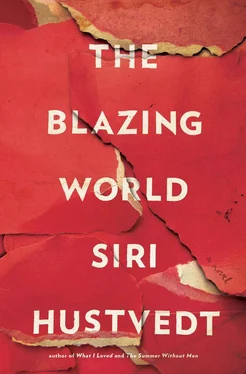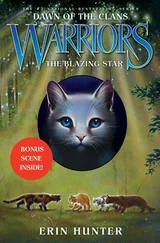Once the show’s glory faded and the journalists had vanished, poor Anton began to fray. He wanted to return to making his own art, but what had seemed vital and alive to him before had turned flat and dull. Everything he touched shriveled in his hands. He meditated and he fasted and he read, but none of it did any good. He had once believed in himself, and now he didn’t. It was all Harry’s fault.
She told me that the last time she saw him, he buzzed her door at two in the morning, and when she opened it, he staggered inside, drunk and angry. His life as an artist was over, he declared, and it made him sick. “You have to talk to me!” he yelled at her. “You have to talk to me.” It was then that Harry had the strange sensation that she was listening to herself howling at Felix. Hadn’t she said to him many times, “You have to talk to me!”?
The two did their talking at Harry’s kitchen table after she made him drink three glasses of water. The boy had been teary and red-faced at first, but then he turned cold.
Harry’s position was that Anton had known what the deal was; that she hadn’t fooled or cheated him; that together they had experimented with a hypothesis about the importance of the artist’s persona in relation to the work shown, and that they had succeeded. Anton had been well paid and had gained a foothold in the art world, should he choose to continue to make art.
Anton agreed that he had known what the plan was from the beginning, that he, too, had been interested in the idea, but he couldn’t have been expected to understand what it would mean for him suddenly to find himself sought after, even “kind of famous.” He had posed for an advertisement for sneakers with several other up-and-coming young artists. He had been interviewed by Bomb and Black Book , had been approached for comments on other shows. He had been invited to countless parties, had slept with girls who wouldn’t have looked at him before. And, he told Harry, he was good at it.
“Good at what?” she had burst out. “Sleeping with girls? What are you talking about?”
“All of it,” he had yelled at her. “The whole thing. They wanted me. Do you think they would have wanted you? Isn’t this what it’s all about? Without me, none of this would have happened.”
Harry winced as she reported the conversation to me. Anton was right, she said. He wanted to hurt me with the truth, and he did. And he went on and on, she said, telling her that the art would have had little effect without him, that his image was what counted, a young, with-it kid who made a lot of references to this and that. “They didn’t know what I was talking about!” he had yelled at her. It had been so easy, dropping the names of works of art he had learned from Harry, but the journalists didn’t care. And, he had continued, the irony was that the only artist that really mattered in all this was Andy Warhol, who understood everything about celebrity fascination all along. “And Warhol was the one artist I really knew something about before you came along. It’s funny, really, really funny. Don’t you get it? All your learning, all your esoteric crap; it’s worth nothing out there, less than nothing!”
“That’s what he said to me, Rachel. I was sitting there, fat and old in my bathrobe, looking at him, and it made sense. Even drunk and in the middle of the night, he looked good. I had picked him, after all. It wasn’t that he was beautiful exactly, but he had an élan ; he embodied an idea.”
Anton had essentially told Harry the story she had told herself all along, but rather than feel vindicated, she had felt hurt and confused. “What do you want, then? You have everything, don’t you? Why come here demanding to talk to me?”
But Anton, it seemed, did not have everything he wanted. He was miserable. He couldn’t work anymore. He had been en route to a grand discovery before he met Harry. He had felt its importance. He had been rich with ideas, fantasies, and thoughts. He had been all set to make his post-Warholian works. He had just needed a bit of time, and he would have burst through into his own solo stardom.
Harry looked at me and rubbed her chin. “I asked him why he didn’t just do it, then.” He couldn’t do it because she had gotten in the way; her ideas had intruded upon his. He didn’t recognize himself anymore. Who was he? He saw her when he looked in the mirror. He had tried to give her the money from the sales, hadn’t he? But now he understood that he was the one who had “made her.” He had contributed hugely to “the whole thing.” Celebrity is not what you do; it’s being seen. It’s making the scene. He had more than earned his commission because he was the boy who had “sold the goods,” but “somewhere along the road,” Anton said, he had lost his “purity.”
His use of the word purity had sent Harry into convulsive laughter. Apparently, she had repeated it over and over. She told me Anton had been modest about his own gifts when she first met him. He had talked about commercial art to pay the bills while he worked on his own “projects.” She had never heard him talk about either stardom or purity.
Harry looked very sad when she told me this. “I created a monster.”
But sitting with Anton in her kitchen, she had been angry, furious. She told him he had completely rewritten the past, that he seemed to have forgotten that she had made the artworks, that the boxes had come out of her body, out of years of work and thought. She had felt like slapping him. This kid, this infant, who had been asking her questions for a year, whom she had mentored and paid for, this child had turned into a smug, deluded, pompous creep.
And then Harry cried on my shoulder. I held her for a while and asked her what she was going to do. She said the experiment hadn’t worked correctly because she wasn’t sure what had happened. Maybe nobody had cared about her boxes. Maybe the boxes had sold just because Anton Tish had supposedly made them. It was too early to claim the work as hers. The ads, the hype, Anton’s face were smoke screens. She would have to wait. She would have to try again. She had another idea. I told Harry that she should think twice before she repeated her experiment. The psychological toll was too great. Whether Anton was right or wrong was less important than the fact that both he and she had suffered over the project. I also ventured that Harry’s problem might be that she had trouble owning her work, that perhaps she felt she didn’t deserve acclaim. She told me sharply not to “psychoanalyze her” and then, instantly regretful, begged me to forgive her.
When I asked how the evening with Anton had ended, she said that although he had clung persistently to the idea that he had been vital to their “success,” he had sulkily admitted that she had transformed his thinking about art. He had no choice but to take time off and plot his next move. He would take the money because he deserved it, and he would travel for a while, see the world, think, and read.
And then a mischievous smile replaced Harry’s formerly anguished expression. Anton, she said, had adopted a high Romantic mode for his farewell, one that required her to leap up from the sofa and demonstrate.
“I will never see you again!”
(Sentence accompanied by Harry enacting sweeping arm gesture from stage melodrama circa 1895, not at all plausible in young man a hundred years later, but I smiled anyway.)
“I am going away, far away, to the Himalayas, to the Sahara, to Paris, to Timbuktu, but first to Queens to get my stuff out of storage.”
(Back of Harry’s right hand moves onto her forehead as she tilts her head upward, eyelids fluttering. She sighs loudly. Lets her hand fall, turns to me, opens her arms.)
Читать дальше












